In today’s fast-paced digital age, businesses must adapt to the evolving marketing landscape to remain competitive. Digital marketing encompasses all marketing efforts that utilize electronic devices or the internet, leveraging channels such as search engines, social media, email, and websites to connect with potential customers. As the CEO of Top SEO Expertz, a UK digital marketing agency, I have seen the transformative power of digital marketing over the past six years.
Digital marketing is significant because it can provide real-time interaction with audiences, foster relationships, build brand awareness, and drive conversions. Unlike traditional marketing, digital marketing offers measurable results, enabling businesses to track and analyze the effectiveness of their campaigns through detailed analytics. This data-driven approach allows for informed decision-making and strategy optimization.
Table of Contents
- The Core Components of Digital Marketing
- Benefits of Digital Marketing for Businesses
- How to Develop an Effective Digital Marketing Strategy
- Tools and Techniques for Successful Digital Marketing
- Tips and Best Practices for Leveraging Digital Marketing Tools
- Common Challenges in Digital Marketing and How to Overcome Them
- How Top SEO Expertz Can Help
- Conclusion
- Frequently Asked Questions (FAQs)
Key components of digital marketing include search engine optimization (SEO), social media marketing, email marketing, content marketing, and pay-per-click (PPC) advertising. Each channel offers unique benefits and can be tailored to specific business goals. At Top SEO Expertz, we are committed to helping businesses harness the power of digital marketing to achieve their objectives and drive growth in today’s dynamic market.
The Core Components of Digital Marketing
Digital marketing is a multifaceted discipline that combines various strategies to reach and engage target audiences online. Understanding the core components of digital marketing is essential for businesses aiming to develop a robust and effective marketing strategy. Here, we delve into the five primary elements of digital marketing: Search Engine Optimization (SEO), content marketing, social media marketing, email marketing, and Pay-Per-Click (PPC) advertising. We will also highlight the importance of each component in achieving marketing success.
-
Search Engine Optimization (SEO)
SEO is optimizing a website to improve its visibility and ranking on search engine results pages (SERPs). The primary goal of SEO is to attract organic (non-paid) traffic by making the website more relevant and accessible to search engines and users. SEO involves several vital practices:
- Keyword Research: Identifying the terms and phrases that potential customers use to search for products or services related to your business. Tools like Google Keyword Planner and SEMrush can help discover high-traffic, low-competition keywords.
- On-Page SEO: Optimizing individual web pages to rank higher. This includes using keywords in titles, meta descriptions, headers, and content and ensuring the site is mobile-friendly and has fast loading times.
- Off-Page SEO: Building backlinks from reputable sites to improve the site’s authority and trustworthiness. This can involve guest blogging, influencer outreach, and content promotion.
- Technical SEO involves enhancing the website’s backend structure, such as improving site speed, ensuring secure connections (HTTPS), and creating an XML sitemap.
The importance of SEO lies in its ability to increase website visibility, drive organic traffic, and build credibility with search engines and users. A well-optimized website not only ranks higher but also delivers a better user experience, which can lead to higher engagement and conversions.
-
Content Marketing
Content marketing focuses on creating and distributing valuable, relevant, consistent content to attract and retain a clearly defined audience. The goal is to drive profitable customer actions by providing content that educates, entertains, or inspires.
- Blog Posts: Regularly updated blogs can drive traffic to your site and establish your authority in the industry. They should be well-researched, informative, and optimized for SEO.
- E-books and Whitepapers: In-depth guides that provide valuable information can generate leads by offering them in exchange for contact information.
- Infographics: Visual content that simplifies complex information and is easily shareable can enhance brand visibility.
- Videos: Video content can significantly boost engagement and conversions, especially on platforms like YouTube and social media.
- Case Studies: Detailed stories of how your product or service has helped customers build credibility and trust.
The importance of content marketing is rooted in its ability to build relationships with the audience, improve brand awareness, and drive long-term customer loyalty. High-quality content can also support other digital marketing strategies by providing material for social media posts, email campaigns, and SEO.
-
Social Media Marketing
Social media marketing involves using social media platforms to promote products or services, engage with the audience, and build brand loyalty. Popular platforms include Facebook, Instagram, LinkedIn, Twitter, and TikTok.
- Content Creation: Developing engaging posts, stories, and videos that resonate with the audience and encourage interaction.
- Community Management: Responding to comments, messages, and mentions to foster a sense of community and address customer inquiries.
- Advertising: Running paid campaigns to reach a broader audience. Social media ads can be highly targeted based on demographics, interests, and behaviors.
- Analytics: Monitoring performance metrics like engagement rates, follower growth, and click-through rates to refine the strategy.
Social media marketing is essential because it can reach a vast audience, facilitate direct customer interaction, and drive website traffic. It also provides valuable insights into customer preferences and behaviors, which can inform other marketing efforts.
-
Email Marketing
Email marketing involves sending targeted emails to a list of subscribers to promote products, share updates, or nurture relationships. It is one of the most cost-effective digital marketing strategies.
- Newsletters: Regularly sent emails that provide valuable content, company news, and updates to keep the audience engaged.
- Promotional Emails: Emails that highlight special offers, discounts, or new products to drive sales.
- Drip Campaigns: Automated emails that guide subscribers through the buyer’s journey, from awareness to conversion.
- Personalization: Using data to tailor emails to the recipient’s preferences and behavior, enhancing relevance and effectiveness.
Email marketing is crucial for maintaining direct customer communication, nurturing leads, and driving conversions. It allows for highly personalized and targeted messages, making it an effective tool for building long-term customer relationships.
-
Pay-Per-Click (PPC) Advertising
PPC advertising is a model where advertisers pay a fee each time their ad is clicked. It is a way of buying site visits rather than organically earning them. Popular platforms for PPC include Google Ads, Bing Ads, and social media networks.
- Search Ads: Text ads that appear on search engine results pages when users search for related keywords.
- Display Ads: Visual ads on websites within the Google Display Network or other ad networks.
- Social Media Ads: Ads that appear on social media platforms, targeting users based on demographics, interests, and behaviors.
- Remarketing involves targeting users who have previously visited your site with relevant ads to encourage them to return and convert.
PPC advertising is essential for driving immediate traffic to your website, especially for competitive keywords. It offers precise targeting and measurable results, making it a practical component of a comprehensive digital marketing strategy.
Drive Instant Traffic with PPC Advertising
Boost your online presence with precise, measurable PPC campaigns.
Get Started with PPCBenefits of Digital Marketing for Businesses
Digital marketing offers a multitude of benefits for businesses of all sizes. By leveraging online channels and strategies, companies can significantly grow brand awareness, lead generation, and sales. Here, we explore these benefits in detail and provide real-world examples and case studies to illustrate the impact of digital marketing.
-
Brand Awareness
One of the most significant benefits of digital marketing is enhancing brand awareness. In the crowded online marketplace, standing out is essential, and digital marketing provides various avenues to make your brand visible to a broader audience.
- Increased Visibility: Digital marketing strategies such as SEO, social media marketing, and content marketing help your business appear in front of potential customers. By optimizing your website for search engines, you can attract organic traffic from users searching for relevant keywords. Similarly, engaging content on social media platforms can reach a broad audience, increasing your brand’s visibility.
- Targeted Reach: Unlike traditional marketing methods, digital marketing allows for precise targeting. You can tailor your campaigns to specific demographics, interests, and behaviors, ensuring your message reaches the right people. For example, Facebook Ads offer detailed targeting options, allowing you to reach users based on location, age, interests, and more.
- Consistent Branding: Digital marketing enables businesses to maintain consistent branding across various channels. Whether it’s your website, social media profiles, or email newsletters, you can ensure that your brand’s voice, visuals, and messaging are cohesive. This consistency helps build a solid and recognizable brand.
Case Study: Nike has successfully leveraged digital marketing to enhance brand awareness. Nike has built a solid online presence through innovative social media campaigns, influencer partnerships, and engaging content. Their “Just Do It” campaign is a prime example of how digital marketing can create a lasting impact on brand perception. -
Lead Generation
Generating high-quality leads is crucial for business growth. Digital marketing offers practical strategies for attracting and converting potential customers into leads.
- Content Marketing: Businesses can attract genuinely interested users to their products or services by creating valuable and relevant content. Blog posts, e-books, webinars, and whitepapers are examples of content that can capture leads. Offering this content in exchange for contact information helps build a list of potential customers.
- SEO and SEM: Search engine optimization (SEO) and search engine marketing (SEM) are powerful tools for lead generation. SEO ensures that your website ranks higher in search engine results, driving organic traffic. Conversely, SEM involves paid search ads that appear when users search for specific keywords. Both strategies ensure that your business is visible to users actively seeking solutions.
- Email Marketing: Email marketing remains one of the most effective lead-generation strategies. Businesses can guide potential customers through the sales funnel by nurturing leads through personalized and targeted email campaigns. Automated email sequences, such as welcome emails and drip campaigns, keep leads engaged and informed.
Case Study: HubSpot, a leading provider of inbound marketing software, excels in lead generation through content marketing and SEO. Its extensive library of blog posts, e-books, and webinars attracts steady leads. HubSpot’s SEO efforts ensure its content ranks high in search results, driving organic traffic to its site. -
Increased Sales
Ultimately, the goal of digital marketing is to drive sales and revenue. By implementing effective digital marketing strategies, businesses can achieve significant sales growth.
- E-commerce Optimization: For e-commerce businesses, digital marketing is essential for driving sales. Optimizing product pages, running targeted ads, and using retargeting strategies help convert visitors into customers. Additionally, providing a seamless and user-friendly online shopping experience encourages repeat purchases.
- Social Proof and Reviews: Digital marketing enables businesses to leverage social proof and customer reviews to build trust and credibility. Positive reviews, testimonials, and user-generated content showcase the quality of your products or services, influencing potential customers’ purchasing decisions.
- Personalization: Personalization is a crucial driver of sales in digital marketing. Businesses can deliver personalized recommendations, offers, and messages by analyzing customer data and behavior. Customized email campaigns, product recommendations, and retargeting ads increase the likelihood of conversions.
Case Study: Amazon is a prime example of a business that has mastered digital marketing to increase sales. Amazon consistently drives sales and revenue through personalized recommendations, targeted ads, and an optimized e-commerce platform. Their use of customer data to deliver customized shopping experiences sets them apart in the digital marketplace.Digital marketing offers unparalleled benefits for businesses, including enhanced brand awareness, effective lead generation, and increased sales. By leveraging various digital marketing strategies, companies can reach a broader audience, build strong relationships with potential customers, and drive significant growth. At Top SEO Expertz, we understand the power of digital marketing and are committed to helping businesses harness its full potential. Whether you want to increase your brand’s visibility, generate high-quality leads, or boost sales, digital marketing is the key to achieving your goals.
Maximize Your Business Growth with Digital Marketing
Discover how digital marketing can amplify your business growth and drive exceptional results today.
Contact UsHow to Develop an Effective Digital Marketing Strategy
Creating an effective digital marketing strategy is crucial for businesses looking to thrive in the digital landscape. A well-crafted strategy helps companies to reach their target audience, achieve their marketing objectives, and drive growth. Here, we outline a step-by-step guide to developing a successful digital marketing strategy, emphasizing the importance of understanding the target audience, setting clear objectives, and choosing the proper channels.
Step 1: Understand Your Target Audience
A deep understanding of your target audience is the foundation of any successful digital marketing strategy. Knowing who your customers are, what they need, and how they behave online allows you to tailor your marketing efforts effectively.
- Create Buyer Personas:
- Develop detailed profiles of your ideal customers, known as buyer personas. Include demographics, interests, pain points, and online behavior.
- Use customer surveys, social media insights, and website analytics data to build accurate personas.
- Conduct Market Research:
- Analyze market trends, competitor strategies, and industry benchmarks to gain insights into your target audience’s preferences and behaviors.
- Use tools like Google Trends, social listening platforms, and competitor analysis tools to gather relevant data.
- Segment Your Audience:
- Divide your audience into smaller segments based on shared characteristics or behaviors. This allows for more personalized and targeted marketing efforts.
- Standard segmentation criteria include demographics, psychographics, geographic location, and buying behavior.
Step 2: Set Clear Marketing Objectives
Setting clear, measurable objectives is essential for guiding your digital marketing efforts and evaluating their success. Objectives should align with your overall business goals and provide a roadmap for your marketing strategy.
- Define SMART Goals:
- Ensure your objectives are Specific, Measurable, Achievable, Relevant, and Time-bound (SMART).
- Examples of SMART goals include increasing website traffic by 20% in six months, generating 50 new leads per month, or boosting social media engagement by 30%.
- Align Objectives with Business Goals:
- Your digital marketing objectives should support your broader business goals, such as increasing sales, expanding market share, or improving customer retention.
- Regularly review and adjust your objectives to align with your business priorities.
- Establish Key Performance Indicators (KPIs):
- Identify the metrics that will be used to measure the success of your marketing efforts. Common KPIs include website traffic, conversion rates, lead generation, and social media engagement.
- Use analytics tools to track and analyze these metrics, providing insights into the effectiveness of your strategy.
Step 3: Choose the Right Digital Marketing Channels

Selecting the appropriate digital marketing channels is crucial for reaching your target audience and achieving your objectives. Different channels serve different purposes and can be used to engage with your audience at various stages of the buyer’s journey.
- Evaluate Channel Effectiveness:
- Assess the strengths and weaknesses of various digital marketing channels, including SEO, content marketing, social media, email marketing, and PPC advertising.
- Consider factors such as audience reach, cost-effectiveness, and the potential for engagement and conversions.
- Create a Multi-Channel Strategy:
- Utilize a combination of channels to maximize your reach and impact. Each channel should complement and reinforce the others, creating a cohesive and integrated marketing strategy.
- For example, use SEO and content marketing to drive organic traffic, social media to engage and build relationships, email marketing to nurture leads, and PPC to generate immediate results.
- Allocate Budget and Resources:
- Determine how much budget and resources will be allocated to each channel based on their potential ROI and alignment with your objectives.
- Regularly review and adjust your budget allocation to ensure optimal performance and return on investment.
Step 4: Develop a Content Strategy
Content is the backbone of digital marketing, driving engagement, building brand awareness, and supporting lead generation and conversions. An effective content strategy ensures that your content resonates with your audience and aligns with your marketing objectives.
- Define Content Goals:
- Establish clear goals for your content, such as educating your audience, generating leads, or driving traffic to your website.
- Align these goals with your overall marketing objectives and audience needs.
- Plan Your Content Calendar:
- Create a content calendar that outlines what content will be produced, when it will be published, and on which channels it will be distributed.
- To keep your audience engaged, ensure a mix of content types, including blog posts, videos, infographics, social media posts, and email newsletters.
- Optimize Content for SEO:
- Conduct keyword research to identify relevant terms and phrases your audience is searching for. Use these keywords strategically in your content to improve search engine visibility.
- Focus on creating high-quality, valuable content that addresses your audience’s pain points and interests.
Step 5: Implement and Monitor Your Strategy
Executing your digital marketing strategy involves implementing your plans across various channels and continuously monitoring performance to ensure success.
- Launch Campaigns:
- Execute your marketing campaigns according to your content calendar and channel strategy. Use marketing automation tools to streamline and manage your efforts.
- Track the performance of each campaign in real-time to identify any issues and make necessary adjustments.
- Analyze Performance:
- Review your KPIs and analytics regularly to measure the effectiveness of your marketing efforts. Gather data using tools like Google Analytics, social media insights, and email marketing platforms.
- Identify trends, patterns, and areas for improvement, and adjust your strategy accordingly.
- Optimize and Refine:
- Continuously optimize your campaigns based on performance data and feedback. Experiment with different approaches, A/B test your content and ads and stay current with industry trends.
- Refine your strategy to align with your objectives and audience needs.
Developing an effective digital marketing strategy requires a thorough understanding of your target audience, clear objectives, and the right mix of marketing channels. Following this step-by-step guide, businesses can create a comprehensive and cohesive strategy that drives growth and achieves their marketing goals. At Top SEO Expertz, we craft tailored digital marketing strategies that deliver results. Whether you want to increase brand awareness, generate leads, or boost sales, our expertise and proven methodologies can help you succeed in the digital landscape.
Grow Your Business with Top SEO Expertz
Partner with Top SEO Expertz to create a digital marketing strategy that drives growth and success.
Contact UsTools and Techniques for Successful Digital Marketing
Leveraging the right tools and techniques is crucial for the success of any digital marketing strategy in the ever-evolving digital landscape. As the CEO of Top SEO Expertz, I have seen how the strategic use of digital marketing tools can enhance efficiency, improve performance, and drive significant results.
Here, we provide an overview of essential digital marketing tools and share tips and best practices for leveraging these tools to enhance your marketing efforts.
Essential Digital Marketing Tools
-
Google Analytics
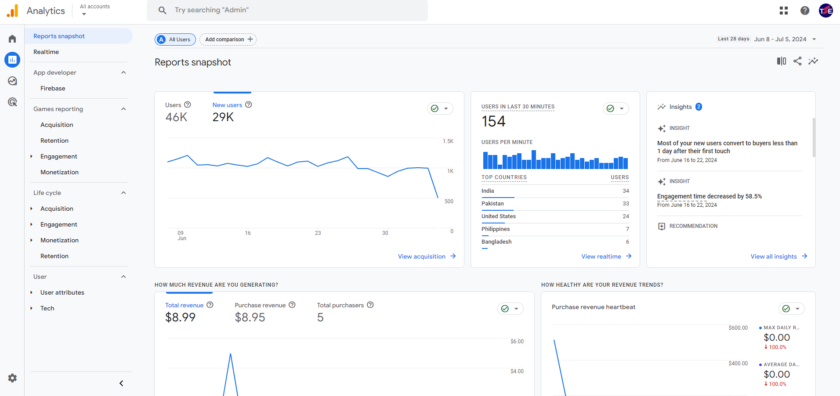
Google Analytics is a powerful tool that provides detailed insights into website traffic and user behavior. It helps businesses understand how visitors interact with their site, track key performance metrics, and make data-driven decisions.
- Key Features:
- Traffic analysis: Monitor the number of visitors, page views, and session duration.
- Audience insights: Understand user demographics, interests, and geographic locations.
- Conversion tracking: Measure the effectiveness of marketing campaigns and track goal completions.
- Behavior analysis: Analyze user behavior on your site, including bounce rates and exit pages.
- Best Practices:
- Set up goals and conversion tracking to measure the success of your marketing campaigns.
- Use custom reports and dashboards to monitor critical metrics relevant to your business.
- Regularly review your traffic sources to identify which channels drive the most valuable traffic.
-
SEMrush

SEMrush is an all-in-one marketing toolkit that offers a wide range of features for SEO, PPC, content marketing, and competitive analysis. It is invaluable for businesses looking to improve online visibility and outperform competitors.
- Key Features:
- Keyword research: Identify high-traffic, low-competition keywords for SEO and PPC campaigns.
- Site audit: Analyze your website’s health and identify technical SEO issues.
- Backlink analysis: Monitor your backlink profile and discover new link-building opportunities.
- Competitor analysis: Gain insights into competitors’ strategies and performance.
- Best Practices:
- Use the keyword magic tool to find relevant keywords and optimize your content accordingly.
- Conduct regular site audits to ensure your website is technically sound and SEO-friendly.
- Analyze your competitors’ backlinks to identify potential link-building opportunities.
-
Hootsuite
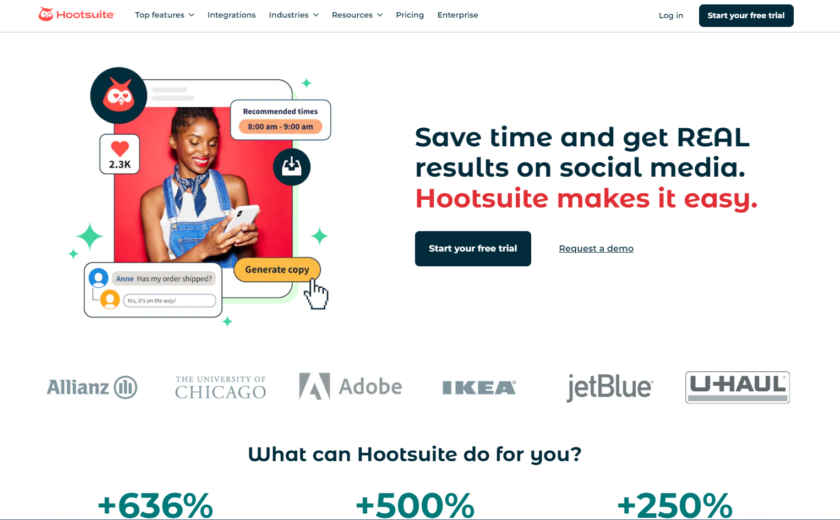
Hootsuite is a social media management platform that allows businesses to manage multiple social media accounts, schedule posts, and analyze performance from a single dashboard. It streamlines social media marketing efforts and enhances productivity.
- Key Features:
- Social media scheduling: Plan and schedule posts across various social media platforms.
- Content curation: Discover and share relevant content with your audience.
- Analytics and reporting: Track social media performance and generate detailed reports.
- Team collaboration: Collaborate with team members and manage social media workflows.
- Best Practices:
- Schedule posts in advance to ensure consistent and timely content delivery.
- Use the content calendar to plan and organize your social media strategy.
- Monitor social media metrics to track engagement, reach, and growth.
-
Mailchimp
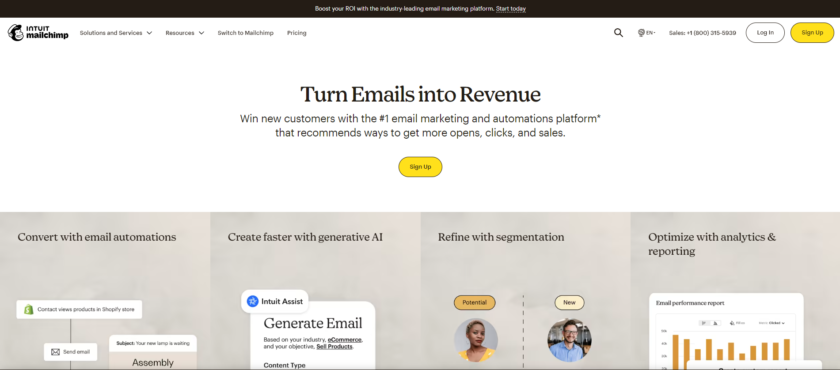
Mailchimp is an email marketing platform that helps businesses create, send, and analyze email campaigns. It is user-friendly and offers various features to enhance email marketing efforts.
- Key Features:
- Email templates: Create visually appealing emails with customizable templates.
- Automation: Set up automated email sequences for lead nurturing and customer engagement.
- A/B testing: Test different email variations to optimize performance.
- Analytics: Track open rates, click-through rates, and conversions.
- Best Practices:
- Segment your email list to deliver targeted and personalized messages.
- Use A/B testing to identify the most compelling subject lines, content, and CTAs.
- Analyze email performance metrics to refine your strategy and improve results.
-
Canva
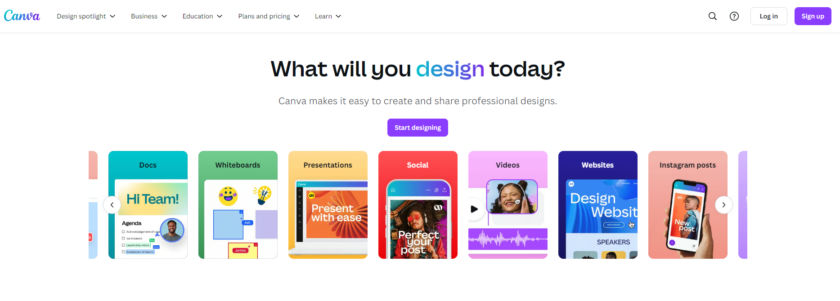
Canva is a graphic design tool that enables businesses to create visually appealing marketing materials, including social media graphics, infographics, and presentations. It is easy to use and offers many templates and design elements.
- Key Features:
- Design templates: Access a variety of templates for different marketing materials.
- Customization: Customize templates with your brand colors, fonts, and images.
- Collaboration: Work with team members to create and edit designs.
- Export options: Export designs in various formats for use across different channels.
- Best Practices:
- Use consistent branding in all your designs to maintain a cohesive brand identity.
- Create visually engaging content that captures attention and drives engagement.
- Collaborate with your team to ensure designs align with your overall marketing strategy.
Tips and Best Practices for Leveraging Digital Marketing Tools
- Integrate Tools for Synergy:
- Integrate different digital marketing tools to create a seamless workflow. For example, connect Google Analytics with SEMrush to gain deeper insights into your SEO performance or integrate Hootsuite with Canva to streamline social media content creation and scheduling.
- Regularly Update and Optimize:
- Update your tools regularly to take advantage of new features and improvements. Stay informed about best practices and industry trends to optimize your use of these tools.
- Invest in Training:
- Invest in training for your team to ensure they are proficient in using the tools. Many platforms offer online courses, tutorials, and certification programs to help users get the most out of their features.
- Monitor and Adjust:
- Use analytics tools to monitor the performance of your marketing campaigns continuously. Use the data to make informed decisions and adjust your strategies for better results.
- Stay Customer-Centric:
- Keep your audience at the center of your digital marketing efforts. Use the insights gained from your tools to understand their needs, preferences, and behaviors and tailor your marketing strategies accordingly.
Leveraging the right digital marketing tools is essential for enhancing your marketing efforts and achieving your business goals. Tools like Google Analytics, SEMrush, Hootsuite, Mailchimp, and Canva provide valuable insights, streamline workflows, and improve efficiency.
By integrating these tools into your digital marketing strategy and following best practices, you can drive better results, optimize performance, and stay ahead of the competition. At Top SEO Expertz, we are committed to helping businesses harness the power of digital marketing tools to achieve success in the digital landscape.
Common Challenges in Digital Marketing and How to Overcome Them
Digital marketing offers tremendous opportunities for businesses to reach and engage their target audiences. However, it also presents several challenges that can hinder success. As the CEO of Top SEO Expertz, I have encountered and overcome many of these obstacles. Here, we discuss some of the most common challenges in digital marketing and provide practical advice and solutions to address them.
Keeping Up with Trends
Challenge: The digital marketing landscape constantly evolves, with new trends, technologies, and platforms emerging regularly. Keeping up with these changes can be overwhelming, and failing to adapt can result in missed opportunities and reduced effectiveness.
Solution:
- Continuous Learning:
- Subscribe to industry blogs, attend webinars, and take online courses to stay informed about the latest trends and developments in digital marketing. Platforms like HubSpot Academy, Coursera, and LinkedIn Learning offer valuable resources for continuous education.
- Network and Collaborate:
- Join online and offline industry groups and communities to exchange knowledge and insights with other professionals. Networking with peers can provide valuable perspectives and help you stay ahead of the curve.
- Experiment and Innovate:
- Allocate a portion of your marketing budget and resources to experiment with new trends and technologies. Testing new strategies can provide insights into what works best for your business and help you innovate your approach.
- Leverage Expert Support:
- Partner with a digital marketing agency like Top SEO Expertz. Agencies have the expertise and resources to stay on top of trends and implement cutting-edge strategies on your behalf.
Measuring ROI
Challenge: Measuring digital marketing efforts’ return on investment (ROI) can be challenging due to the complexity and variety of channels and metrics involved. Without clear visibility into ROI, it’s difficult to justify marketing spending and make informed decisions.
Solution:
- Set Clear Objectives:
- Define specific, measurable, achievable, relevant, and time-bound (SMART) goals for your digital marketing campaigns. Clear objectives provide a framework for measuring success and evaluating ROI.
- Track Key Performance Indicators (KPIs):
- Identify the most relevant KPIs for your business, such as website traffic, conversion rates, lead generation, customer acquisition cost, and lifetime value. Use analytics tools like Google Analytics, SEMrush, and social media insights to monitor these metrics.
- Implement Multi-Touch Attribution:
- Use multi-touch attribution models to track the customer journey across various touchpoints and understand the contribution of each channel to conversions. Tools like Google Analytics 360 and Adobe Analytics offer advanced attribution capabilities.
- Regular Reporting and Analysis:
- Establish a routine for generating and reviewing marketing performance reports. Regular analysis helps identify trends, strengths, and areas for improvement. Adjust your strategies based on data-driven insights to optimize ROI.
- Use Marketing Automation:
- Implement marketing automation tools like HubSpot, Marketo, or Mailchimp to streamline campaign management, track interactions, and measure the impact of your efforts. Automation reduces manual work and enhances accuracy in reporting.
Maintaining Consistency Across Channels
Challenge: Ensuring a consistent brand voice and message across multiple digital marketing channels can take time and effort. Inconsistencies can confuse your audience and weaken your brand identity.
Solution:
- Develop a Brand Style Guide:
- Create a comprehensive brand style guide that outlines your brand’s voice, tone, messaging, visual elements, and design standards. Ensure all team members and partners have access to and follow the guide.
- Centralized Content Management:
- Use content management systems (CMS) and social media tools like Hootsuite or Buffer to centralize content planning, creation, and scheduling. A centralized approach ensures consistency and streamlines coordination.
- Regular Training and Communication:
- Conduct regular training sessions for your marketing team to reinforce brand guidelines and best practices. Maintain open communication to address any questions or issues promptly.
- Audit and Review:
- Periodically audit your digital marketing content and campaigns across all channels to ensure consistency. Make adjustments as needed to align with your brand standards.
Digital marketing presents several challenges, from keeping up with trends to measuring ROI and maintaining consistency. By adopting a proactive approach, staying informed, leveraging the right tools, and partnering with experts like Top SEO Expertz, businesses can overcome these obstacles and achieve digital marketing success. Addressing these challenges effectively ensures that your marketing efforts are impactful, measurable, and aligned with your business goals.
How Top SEO Expertz Can Help
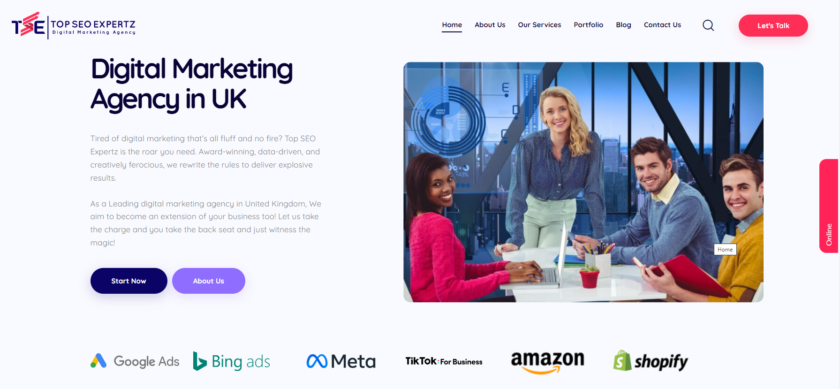
In the dynamic world of digital marketing, having the right partner can make all the difference. As the CEO of Top SEO Expertz, I am proud to introduce our agency and the comprehensive range of services we offer to help businesses thrive online. Our expertise and our status as a Google Partner agency position us uniquely to support your digital marketing needs.
-
Who We Are: An Introduction to Top SEO Expertz
Top SEO Expertz is a full-service digital marketing agency UK, helping businesses achieve their online goals. Our team of certified professionals specializes in digital marketing, including SEO, content marketing, social media management, PPC advertising, and more. We are dedicated to delivering customized strategies that align with our client’s objectives and drive measurable results.
Our status as a Google Partner agency underscores our commitment to excellence and proficiency in utilizing Google’s tools and platforms to maximize our client’s success. Whether you are a small business looking to establish your online presence or a large enterprise aiming to enhance your digital strategy, Top SEO Expertz is equipped to support you at every step.
-
Comprehensive Digital Marketing Services
- Search Engine Optimization (SEO):
- Our SEO services are designed to improve your website’s visibility on search engines, drive organic traffic, and increase your online presence. We conduct thorough keyword research, optimize on-page elements, build high-quality backlinks, and ensure your site is technically sound.
- Content Marketing:
- We create compelling and valuable content that resonates with your audience and supports your marketing goals. Our content marketing services include blog writing, e-books, whitepapers, infographics, and video production, all tailored to engage and convert your target audience.
- Social Media Management:
- Our social media experts manage your profiles across platforms like Facebook, Instagram, LinkedIn, and Twitter. We develop and execute strategies that foster engagement, build brand loyalty, and drive traffic to your website. Our services include content creation, scheduling, community management, and performance analysis.
- Pay-Per-Click (PPC) Advertising:
- Our PPC campaigns are designed to deliver immediate results and maximize your ROI. We create targeted ads on platforms like Google Ads and social media networks, ensuring your ads reach the right audience at the right time. Our services include campaign setup, keyword bidding, ad creation, and performance monitoring.
- Email Marketing:
- We help you connect with your audience through personalized and automated email campaigns. Our email marketing services include list management, campaign design, A/B testing, and analytics, ensuring your messages resonate and drive conversions.
- Web Design and Development:
- Our designers and developers create visually appealing, user-friendly, and SEO-optimized websites. We ensure your site looks great and performs well, providing a seamless experience for your visitors.
- Search Engine Optimization (SEO):
Partner with Top SEO Expertz for Your Digital Success
Discover how Top SEO Expertz can elevate your digital presence and drive growth.
Contact UsConclusion
In today’s digital age, a well-executed digital marketing strategy is essential for businesses to thrive and stay competitive. Throughout this guide, we have explored the core components of digital marketing, including SEO, content marketing, social media marketing, email marketing, and PPC advertising. Each element is crucial in reaching and engaging your target audience, driving traffic, generating leads, and increasing sales.
Understanding your target audience, setting clear and measurable objectives, and choosing the proper digital marketing channels are foundational to an effective strategy. Leveraging the right tools and techniques, such as Google Analytics, SEMrush, Hootsuite, and Mailchimp, can significantly enhance your marketing efforts by providing valuable insights and streamlining your workflows. Addressing common challenges, like keeping up with trends and measuring ROI, is crucial for maintaining the effectiveness of your strategy.
Digital marketing is not just about deploying tactics; it’s about creating meaningful connections with your audience and delivering value at every touchpoint. The dynamic nature of digital marketing requires businesses to be adaptable, continuously learning, and optimizing their strategies to stay ahead of the competition.
Partnering with Top SEO Expertz can elevate your digital marketing efforts, we bring a wealth of knowledge, expertise, and proven methodologies to help you succeed online. Our comprehensive services, from SEO and content marketing to social media management and PPC advertising, are tailored to meet your unique needs and drive measurable results.
By choosing Top SEO Expertz as your digital marketing partner, you gain access to a team of certified professionals dedicated to your success. We work collaboratively with you to develop and implement strategies that align with your business goals and deliver exceptional outcomes. Contact us today to discover how we can help you achieve your digital marketing objectives and drive sustainable growth. Together, we can navigate the complexities of digital marketing and create a winning strategy that sets you apart.
Frequently Asked Questions (FAQs)
Digital marketing can be complex and ever-evolving, leading to many questions from businesses looking to navigate this landscape effectively. Here, we address some of the most common questions related to digital marketing, providing clear and concise answers to help you understand its essential aspects.
What is digital marketing?
Why is digital marketing important for my business?
What are the core components of digital marketing?
- Search Engine Optimization (SEO): Optimizing your website to rank higher on search engine results pages.
- Content Marketing: Creating and distributing valuable content to attract and engage your audience.
- Social Media Marketing: Using social media platforms to promote your brand and interact with customers.
- Email Marketing: Sending targeted emails to nurture leads and build customer relationships.
- Pay-Per-Click (PPC) Advertising: Running ads on search engines and social media platforms to drive traffic and conversions.
How do I develop an effective digital marketing strategy?
- Understand Your Target Audience: Create detailed buyer personas and conduct market research to know your audience’s needs and behaviors.
- Set Clear Objectives: Define SMART (Specific, Measurable, Achievable, Relevant, Time-bound) goals that align with your business objectives.
- Choose the Right Channels: Select the digital marketing channels that best reach your target audience.
- Develop a Content Strategy: Plan and create valuable content that addresses your audience’s pain points and interests.
- Implement and Monitor: Execute your strategy, track performance using analytics tools, and adjust as needed to optimize results.
How can SEO benefit my business?
What is the role of social media in digital marketing?
How do I measure the success of my digital marketing efforts?
- Website Traffic: The number of visitors to your site.
- Conversion Rates: The percentage of visitors who complete a desired action (e.g., purchasing or filling out a form).
- Engagement Rates: Interactions on social media posts, such as likes, comments, and shares.
- Click-Through Rates (CTR): The percentage of people who click on your ads or email links.
- Return on Investment (ROI): The revenue generated from your marketing efforts compared to the cost.
What is PPC advertising, and how does it work?
How can Top SEO Expertz help my business with digital marketing?
By addressing these common questions, we aim to provide clarity and guidance on digital marketing, helping you navigate this dynamic field and leverage its potential to grow your business. If you have more questions or need personalized assistance, don’t hesitate to get in touch with us at Top SEO Expertz. We’re here to help you succeed in the digital world.





